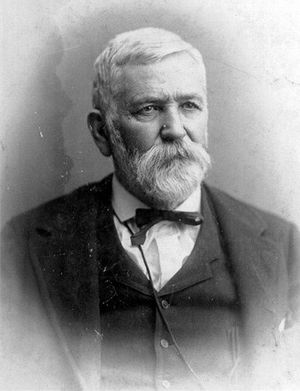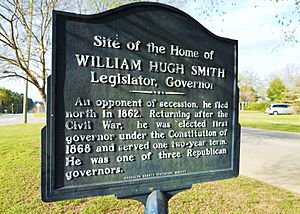William Hugh Smith facts for kids
Quick facts for kids
William Hugh Smith
|
|
|---|---|
 |
|
| 21st Governor of Alabama | |
| In office July 24, 1868 – November 26, 1870 |
|
| Lieutenant | Andrew J. Applegate (1868–70) Vacant (1870) |
| Preceded by | Wager Swayne |
| Succeeded by | Robert B. Lindsay |
| Member of the Alabama House of Representatives | |
| In office 1855–1859 |
|
| Personal details | |
| Born |
William Hugh Smith
April 26, 1826 New York City, U.S. |
| Died | January 1, 1899 (aged 72) Birmingham, Alabama, U.S. |
| Political party | Republican Democratic |

William Hugh Smith (born April 26, 1826 – died January 1, 1899) was an American politician. He served as the 21st Governor of Alabama. He was the first Republican to be elected governor in Alabama. He held this important job from 1868 to 1870. This was during a time called Reconstruction, after the American Civil War.
Before the war, Smith owned enslaved people. He did not want the Southern states to separate from the United States. He worried that leaving the Union would put his property, including enslaved people, at risk.
Early Political Life
From 1855 to 1859, William Hugh Smith was a member of the Alabama House of Representatives. He started as a Democrat who believed in "states' rights". Over time, his views changed, and he became a strong supporter of the Union.
During the Civil War, in 1862, Smith went to areas controlled by the Union army. He spent the rest of the war helping to gather soldiers for the 1st Alabama Cavalry Regiment (Union). This group fought for the Union. He even joined General William Tecumseh Sherman on his famous "March to the Sea."
Governor of Alabama
After the war, Smith became a leader in the Republican Party in Alabama. In 1867, he led the first big meeting for Republicans in the state. The U.S. Congress made him the Governor of Alabama in July 1868. Even though he was elected earlier in February 1868, he waited to take office. This was because voters had not yet approved the new state constitution.
As governor, Smith was quite careful in his decisions. He supported giving voting rights back to former Confederate officials and military officers. These people had lost their right to vote for a while. He also took limited action against groups like the Ku Klux Klan. He believed that local police could handle these issues. Smith worked to improve Alabama's economy. He also pushed for more railroads, which were important for growth.
Later Career and Legacy
William Hugh Smith tried to be re-elected as governor but lost by a small number of votes. Robert B. Lindsay won with 77,721 votes, while Smith received 76,292 votes.
Smith continued to be active in the Republican Party. In 1873, Governor David P. Lewis made him a Circuit Judge. He also served as the 6th Chairman of the Alabama Republican Party from 1875 to 1878. Later, he worked as a Federal District Attorney under President James A. Garfield.
William Hugh Smith died in Birmingham, Alabama, when he was 72 years old. He was buried at Oak Hill Cemetery. His son, John A. W. Smith, also tried to become governor of Alabama in 1902, but he was not successful.
 | Charles R. Drew |
 | Benjamin Banneker |
 | Jane C. Wright |
 | Roger Arliner Young |

